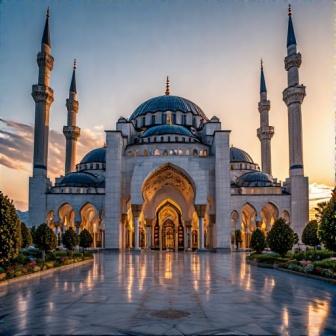The presence of Muslim communities in Western societies represents one of the most significant demographic and cultural developments of the modern era. This article examines the historical foundations and contemporary realities of Muslim communities in Europe and America, drawing from Islamic primary sources and historical documentation to provide a comprehensive understanding of this complex topic.
Early Islamic Teachings on Interfaith Coexistence
The Quran establishes fundamental principles for Muslim interaction with other communities.
The verse “There shall be no compulsion in religion” (2:256) sets a foundational framework for religious tolerance. Additionally, the Quran states: “O mankind, indeed We have created you from male and female and made you peoples and tribes that you may know one another” (49:13), emphasizing the divine wisdom behind human diversity.
Prophet Muhammad’s ﷺ practical implementation of these principles is demonstrated in the Constitution of Medina, history’s first written constitution, which established a pluralistic society where different religious communities could coexist under mutual protection and respect.
Historical Foundations
Early Muslim Presence in Europe
The early Muslim presence in Europe wasn’t merely one of military conquest, as often portrayed.
The Quran encourages Muslims to travel and establish peaceful relations: “Travel through the land and observe how He began creation” (29:20). This divine encouragement led to the establishment of trading networks and scholarly exchanges long before military expansions.
The Prophet ﷺ said: “Seeking knowledge is obligatory upon every Muslim” (Ibn Majah), which motivated Muslims to establish centers of learning wherever they settled. This hadith partly explains the remarkable speed with which Islamic civilizations established educational institutions in new territories.
The American Muslim Experience
The first significant Muslim presence in America came through the tragic circumstances of the trans-Atlantic slave trade. Historians estimate that up to 30% of enslaved Africans were Muslim.
The Quran’s emphasis on human dignity and equality – “And We have certainly honored the children of Adam” (17:70) – provided spiritual resistance against the dehumanizing effects of slavery.
Contemporary Demographics and Challenges
European Muslim Communities
Current European Muslim populations face unique challenges in maintaining religious identity while integrating into secular societies.
The Quranic principle “For you is your religion, and for me is my religion” (109:6) provides guidance for maintaining religious identity while respecting societal diversity.
Statistical Overview:
- France: 5-6 million Muslims (8.8% of population)
- Germany: 4.5 million Muslims (5.7% of population)
- United Kingdom: 3.4 million Muslims (5.2% of population)
American Muslim Communities
American Muslims represent one of the most diverse religious communities in the United States. The Prophetic hadith “The believers in their mutual kindness, compassion and sympathy are just like one body” (Bukhari) has inspired American Muslims to build unified communities despite ethnic and cultural differences.
Integration Challenges and Solutions
Religious Practice in Secular Contexts
Muslims in the West face various challenges in practicing their faith, from workplace accommodation for prayer times to dietary restrictions. The Islamic principle of necessity (darura) provides flexibility, as evidenced by the Quranic verse: “Allah intends for you ease and does not intend for you hardship” (2:185).
Identity Formation
Young Muslims in the West often struggle with identity formation. The Prophetic tradition encourages maintaining cultural identity while adapting to new environments: “The best among you are those who best benefit mankind” (Bukhari).
Future Prospects
Building Bridges
The Quranic instruction to “cooperate in righteousness and piety” (5:2) provides a framework for Muslim communities to engage positively with wider society while maintaining religious identity.
Emerging Trends
- Growing political participation
- Increased interfaith dialogue
- Development of Western Islamic scholarship
- Integration of Islamic principles with Western contexts
Conclusion
Muslim communities in the West represent a unique chapter in Islamic history, demonstrating the religion’s adaptability and universality. The Quranic principle that diversity is divinely ordained – “If Allah had willed, He would have made you one nation” (5:48) – provides a theological framework for maintaining religious identity while contributing positively to pluralistic societies.







